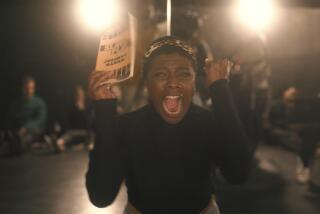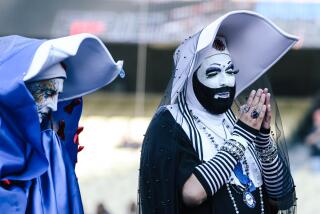Review: Where’s ‘The Pride’ in love? The way we’ve pursued it then and now
The colors of the rainbow, a cheery symbol of gay pride, illuminate the lobby of the Wallis as visitors arrive for performances of a play called “The Pride.” Such a public display of solidarity would be inconceivable for half of the play’s characters, living as they do in the late 1950s. The other half, who reside in the present day in this time-traveling drama, take it for granted.
Such is human nature, to forget to look back along the road to see how far we’ve come.
This 2008 play by London-based Alexi Kaye Campbell focuses resolutely on the road while navigating the many bumps along it. For better and worse, we feel every minute and every jolt of the journey, due to occasionally clumsiness of storytelling and an often-poky presentation.
“The Pride” has been prominently produced in England on several occasions and was given a high-profile 2010 production in New York led by Hugh Dancy and Ben Whishaw. The Los Angeles premiere is directed by Michael Arden, whose high visibility at the Wallis has included an inventive revival of the musical “Spring Awakening,” which transferred to Broadway, and last fall’s artist-in-residence staging of “Merrily We Roll Along.”
The story begins in 1958 as an attractive London couple in their mid-30s, Philip (Neal Bledsoe) and Sylvia (Jessica Collins), host her colleague, Oliver (Augustus Prew), whom Philip is meeting for the first time. Philip and Sylvia are a bit stiff and formal around each other but seemingly simpatico.
Around Oliver, Philip proves even more stiff and formal — ramrod straight, face tight, voice modulated to its lowest register — whereas Oliver, though also reserved, is a bit more loosey-goosey, given to occasional slips of more animated expressions or gestures.
If we don’t already know where this is going, we are given several more hints, as when Philip, alone with Oliver, guardedly says, “I’ve never met anyone like you before” and, still more veiledly, expresses a sense of expectation, as if he’d dreamed Oliver into existence.
The covertness is necessary at a time when Englanders still could be brought up on charges of gross indecency, Oscar Wilde-style — when so much as a smile or stray touch was feared because it could give you away.
Appropriate to that atmosphere, everyone is dressed in grays that are as reserved as the actors’ upper-crust British accents (costumes by Danae Iris McQueen).
For this in-the-round staging, the playing area is set with furnishings of timelessly classic profile, all made of clear acrylic (Arden doubles as designer). This neatly facilitates the story’s jumps in time to 2008, when we are plunged into the out-of-control sex life of another Oliver (also Prew), whose infidelities have spurred boyfriend (Bledsoe) Philip’s third flight from their fledgling relationship.
The costumes are more colorful now, but the mood is not entirely sunny. “I don’t know what I want anymore,” Oliver eventually sighs to his gal pal Sylvia (Collins). With every sexual satisfaction a mere tap of a computer key away, he’s lost touch with what was important in the first place.
As the scenes continue to alternate in 50-year jumps, characters from opposite eras wander past each other during the changeovers of time, pausing as though they’ve sensed each other. The effect is haunting, even a bit supernatural. Within scenes, sound effects are thick with symbolism: a ticking clock, hammering rain.
Social attitudes shift from a tentative declaration of “I felt that I had a pride” by the Oliver of the ’50s to a Champagne-toasted pride celebration in the present-day. Along the way, the characters progress through need, loneliness, repression, degradation, selfishness and damage to themselves and others. Painfully, they are reborn. Women are unsung heroes, underappreciated and sometimes betrayed as they nudge the men toward betterment.
Campbell also wrote the screenplay for the much-admired “Woman in Gold,” about the legal effort to recover a Nazi-looted Klimt painting. Ideas crackle in “The Pride,” which, when introduced in London, was bestowed with such award designations as most promising playwright and best new play. Still, his approach can be heavy-handed: present-day Oliver, for instance, is willingly humiliated by an escort he’s requested to wear ’40s Nazi attire — a manifestation of internalized oppression. And just before intermission, the play all but dares you to leave as it depicts an angry, brutal sex act.
Departure might be further impelled by the production’s longueurs as Arden and his actors mistake non-expression for ’50s-era British reserve. The nascent passion between the men is very nearly unreadable, and the small talk seems interminable.
But to leave would be to miss these otherwise fine performances, including that of Matthew Wilkas in a series of mostly comic roles, such as a jumpy, straight magazine editor whose efforts to seem open-minded are so filled with stereotypical assumptions that they prove just the opposite.
What’s more, early departure would mean forgoing the play’s exhortation, which the Wallis has timed to Pride Month, to live authentically and never let anyone cause you to regress.
♦ ♦ ♦ ♦ ♦ ♦ ♦ ♦ ♦ ♦
‘The Pride’
Where: The Wallis Annenberg Center for the Performing Arts, 9390 N. Santa Monica Blvd., Beverly Hills
When: 8 p.m. Tuesdays-Fridays, 2 and 8 p.m. Saturdays, 2 and 7 p.m. Sundays; ends July 9
Tickets: $50-$60, subject to change
Info: (310) 746-4000, www.thewallis.org
Running time: 2 hours, 40 minutes
SIGN UP for the free Essential Arts & Culture newsletter »
Twitter: @darylhmiller
ALSO:
Q&A with Neal Bledsoe of “The Pride”
The puppet orgy is back in a triumphant reworking of ‘Young Caesar’ at Disney Hall
More to Read
The biggest entertainment stories
Get our big stories about Hollywood, film, television, music, arts, culture and more right in your inbox as soon as they publish.
You may occasionally receive promotional content from the Los Angeles Times.











